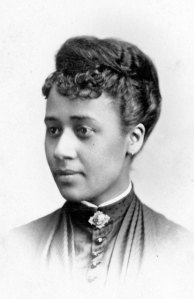Anna Julia Cooper (1858–1964) put no limits on the intellectual potential of Black people, Black women in particular. Her own intellectual and educational achievements are a testament to her firm belief that women’s opportunities for learning and education should not be less than or different than men based on assumptions about women’s capabilities.
I’m particularly drawn to the life of Anna Julia Cooper because she did it all: was a leading Black spokeswoman; held leadership in women’s organizations; founded the first chapter of the YWCA Camp Fire Girls for Black girls; served as principal and teacher in the “renowned Dunbar High School in Washington, DC;” started a night school for working people to attend college; and authored a seminal book on Black feminism, A Voice from the South.
Even as she focused her energy and attention on cultivating the potential of marginalized people, she also continued to work on her own education. In 1924, Cooper received her Ph.D. from the University of Paris, becoming only the fourth Black woman in the United States to earn a doctorate degree.
Despite these extraordinary accomplishments of a Black woman born in the South and formerly a slave, what captivates me most about Dr. Cooper is that she didn’t seek attention. Dr. Paul Cooke, one of her biographers, wrote that she chose the “lesser light.”
She was dedicated to a larger cause than herself and refrained from crediting her own achievements. An example of Dr. Cooper’s humility is what Dr. Mary Helen Washington shared in her Introduction to Cooper’s Book in the Shomburg Library Collection of Nineteenth-Century Black Women Writers.
“In 1982, when Louise Hutchinson, staff historian at the Smithsonian Institution, completed her biography of Cooper, she called for an official Smithsonian car and hand-delivered the copy of the biography to Mrs. Regia Haywood Bronson, the eldest of the five children Anna Cooper had adopted in 1915.
“Then in her late seventies, Mrs. Bronson took the book from Hutchinson, and holding it to her breast, she rocked back and forth with tears streaming down her face, but not saying a word. When Hutchinson asked her why she was crying, Bronson said, ‘Nobody ever told me Sis Annie was important.’”
Yes, Anna Julia Cooper was important, indeed, in advocating for social justice and equality of rights for all people and the education of Black women, in particular.
Living to be 105 years old, she lived to see a celebration of Black History Month and Women’s History Month. She would have been pleased to see the theme of the 2024 Women’s History Month—Women Who Advocate for Equity, Diversity, and Inclusion.
Sources:
Anna Julia Cooper Project: cooperproject.org/about-anna-julia-cooper
Introduction in the Schomburg Library Collection of Nineteenth-Century Black Women Writers: Cooper, Anna Julia. A Voice From the South. (United Kingdom: Oxford University Press, 1988).

